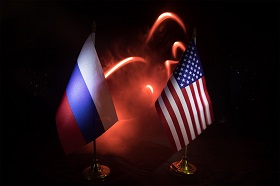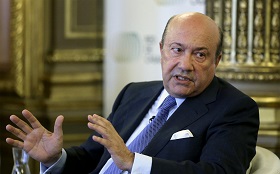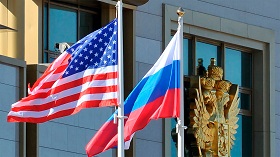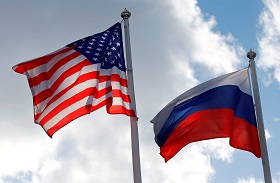The mainstream media make frequent reference to the idea that the United States is viewed negatively by the majority of Russians. Similarly, we are accustomed to hearing that Russia — understood as the Russian authorities — is hostile to America. In both cases, we are dealing with purposely broad generalizations that are inherently misleading. It cannot be said that they are totally erroneous, but they certainly oversimplify the picture. Now more than ever, in the aftermath of the Russian collusion hoax and ongoing anti-Russia hysteria, it is important to understand the current social and political dynamics of the U.S.-Russia relationship.
First of all, the universal rejection of America by the Russian public is not the case anymore. According to a survey conducted by the Levada Center, 42% of Russians viewed the U.S. positively in January 2020. Russian anti-Americanism peaked in 2015 and has considerably declined since then, despite remaining disagreements in Russian-American relations. Moreover, in November 2019, the Russian Public Opinion Research Center reported that Russians supported the strengthening of Russian-American cooperation in the domains of security (52% of respondents), culture (47%), and politics (45%), which essentially means that Russians are ready for a potential reset of U.S.-Russia relations.
More importantly, even if Russians’ aversion to America and the West as such does exist, it in no way applies to all areas of life. As sociologist Denis Volkov put it, “for Russians, the West was and is a symbol of a rich, prosperous life,” and it seems that no geopolitical contradictions could change this notion. Zachery Tyson Brown writes that “Russia and the United States are so fixated on one another because each sees in the other a warped reflection of itself.” The U.S. is Russia’s coveted “Other,” since the political life of Russia without hating, loving, criticizing or admiring America is hard to imagine.
The inability to differentiate between the interests of governments and their respective citizens has been an underlying cause to many of the modern misconceptions held by policy-makers and experts. Over time, these misconceptions have acted as assumptions that are fundamental to their decision-making process. It is naturally a product of disinformation and the media environment that exists today. The fact of the matter is that countless great decisions can ultimately be undermined by the wrong assumption.
If Russia and the United States refuse to make substantial efforts directed at improving bilateral relations, nothing bad will necessarily happen. The system will kick right back into gear and the cycle will simply continue. Primarily, incident prevention mechanisms, bilateral diplomatic channels, and international institutions are able to prevent any real escalation of Russian-American disputes. However, the existing tensions between Washington and Moscow have dramatically limited the capacity of the international community to address global and regional challenges. Better Russia-America relations would create new opportunities not only for the two parties, but also for the rest of the world.
The mainstream media make frequent reference to the idea that the United States is viewed negatively by the majority of Russians. Similarly, we are accustomed to hearing that Russia – understood as the Russian authorities — is hostile to America. In both cases, we are dealing with purposely broad generalizations that are inherently misleading. It cannot be said that they are totally erroneous, but they certainly oversimplify the picture. Now more than ever, in the aftermath of the Russian collusion hoax and ongoing anti-Russia hysteria, it is important to understand the current social and political dynamics of the U.S.-Russia relationship.
America in Russia’s Social Discourse
First of all, the universal rejection of America by the Russian public is not the case anymore. According to a survey conducted by the Levada Center, 42% of Russians viewed the U.S. positively in January 2020. Russian anti-Americanism peaked in 2015 and has considerably declined since then, despite remaining disagreements in Russian-American relations. Moreover, in November 2019, the Russian Public Opinion Research Center reported that Russians supported the strengthening of Russian-American cooperation in the domains of security (52% of respondents), culture (47%), and politics (45%), which essentially means that Russians are ready for a potential reset of U.S.-Russia relations.
More importantly, even if Russians’ aversion to America and the West as such does exist, it in no way applies to all areas of life. As sociologist Denis Volkov put it, “for Russians, the West was and is a symbol of a rich, prosperous life,” and it seems that no geopolitical contradictions could change this notion. Zachery Tyson Brown writes that “Russia and the United States are so fixated on one another because each sees in the other a warped reflection of itself.” The U.S. is Russia’s coveted “Other,” since the political life of Russia without hating, loving, criticizing or admiring America is hard to imagine.
Take, for example, Russia’s internal political disputes. At first glance, pro-American and pro-European opposition leaders appear to promote a westernization agenda contrasted with the patriotic agenda of the Russian government. In reality, all Russia’s political actors are somehow engaged in the interpretation of the American experience, trying to adjust it to their own needs. Russian patriotism is not inward-looking — it is apparently a projection in some ways. One of the most popular pro-government talk shows broadcasted by Russia’s state television is called “60 Minutes,” both high-ranking officials and “freedom fighters” gladly send their children to British and American universities, whereas the creation of a Russian version of Silicon Valley has been one of the core elements of Russia’s innovation policies under Vladimir Putin. Russia relies too much on America’s experience to be called its enemy: this relationship more closely resembles lingering grudges between old friends rather than enmity or hostility.
America in Russia’s Foreign Policy Discourse
Many of Russia’s international activities of recent decades can be attributed to Russia's quest to achieve an equal position with the U.S. and to act like America has equipped Russia with a multitude of foreign policy instruments that would not have been used but for Washington’s opening move. Russian political experts often say that the 2014 referendum in Crimea was the same thing as Kosovo’s independence in 2008. From the U.S. perspective, Crimea is not Kosovo. From Russia’s perspective, there is not much difference between the two cases.
The point is that Russia’s realpolitik emphasizes legal and procedural aspects, but allows no sacred values. Russians have repeatedly stated that the American-led intervention in Syria was not endorsed by the Syrian Government, whereas Russia was officially requested to provide military aid. Another common refrain is that the 2014 revolution in Ukraine led to the toppling of a popularly elected President, whom Russia was glad to support. In both cases, the Kremlin supported the status quo rather than political change. From Russia’s realpolitik perspective, the rules-based international order embodies western hegemony rather than the common good. Moscow does not view the protection of this order as a goal in itself. This brings us to a very important point: Russians simply do not believe that America’s foreign policy can be based on values and principles rather than on geopolitical motivations. Most Russians are deeply convinced that democratic principles are only a pretext to justify Washington’s interference in the affairs of other nations. This perception applies both to Syria and Ukraine. It may appear superficial to a liberal American, but it appears perfectly logical to a Russian.
Furthermore, Russians too often overestimate the centrality of their country to America’s foreign policy. This is visible especially in arms control debates: Russian politicians see Russian-American arms control treaties as the cornerstone of international security, as if we continued to live in a bipolar world structured around Soviet-American relations. Russia’s possession of nuclear weapons and mutually assured destruction capacity are still viewed as major determinants of both bilateral relations and world politics. Consequently, Russian authorities expect the U.S. and its allies to recognize Moscow's role in guaranteeing international stability and peace. One of the key goals of Russia’s major foreign policy initiatives is to reiterate this importance. Another feature of Russia’s foreign policy discourse is the tendency to perceive the U.S. as “an all-powerful orchestrator of global political developments.” This actually resembles how some American pundits view Russia, while Russian media attribute many political developments in Russia and abroad to the activities of American state agencies and non-governmental organizations.
All these perceptions and peculiarities have a considerable impact on U.S.-Russia relations. This impact is not necessarily detrimental as such, but Moscow and Washington should become more aware of it in an effort to choose better policy options in bilateral interactions.
Making Russians Pro-American
Russian-American rapprochement would become closer if the U.S. and Russia could adjust to prejudices and biases against each other existing in their societies and political systems. That said, there are several policy changes that should be implemented by Washington to make Russians and Russia’s authorities more positive about America and its policies.
1. Deal with Russia’s ambitions
It is sometimes argued that Russia’s ambitions have no limits. In fact, this is not the case at all. Russia seeks some political influence in the post-Soviet space and resents the U.S. for expanding America’s influence in Europe. Washington should carefully evaluate Russia’s aspirations and satisfy those that can be met without hampering American interests. The recognition of the Eurasian Economic Union and the suspension of NATO enlargement would probably be enough to neutralize Russia’s suspicion.
2. Speak Russia’s language
Russia tends to see global politics in terms of hard power and influence rather that values and soft power. Therefore, the U.S. could allow Russia to achieve formal political dominance in its regions of interest, while ensuring America’s informal dominance and leadership. Kyrgyzstan, Kazakhstan, Armenia, which are typically viewed as Russia’s allies, maintain perfect relations with the West. These countries may become role models of successful Russian-American cooperation: it seems that Washington and Moscow have no deep disagreements over Kazakhstan's or Kyrgyzstan's geopolitical stances.
3. Sign agreements that are win-win
Russian policy-makers feel concerned about the unravelling of the Russian-American arms control framework. They sincerely believe that U.S.-Russia bilateral treaties are central to international peace and stability. Moscow views its nuclear arms as an important part of Russia’s political standing; strategic dialogue with Moscow implies the recognition of Russia's role in international relations. If the U.S. agrees to revive the bilateral arms control dialogue, it will take an important step towards better relations with Russia.
4. Encourage peer-to-peer dialogue
As noted above, Russians see America and the West as the locus of economic wealth and power. They would be pleased to learn from the American experience, even though they may view the U.S. negatively. Russia’s authorities are unhappy with foreign interference in internal political affairs, but cultural and humanitarian cooperation channels remain open, and they provide great opportunities for strengthening bilateral relations.
Long-Term Prospects
There is reason to hope that Russians’ attitude to America and Americans will further improve in the foreseeable future. As Denis Volkov put it, “Most likely, when sanctions are lifted, the general positive mood will quickly recover.” However, he also stated that “suspicion of latent western hostility towards Russia, as well as distrust of the U.S. and the EU, will persist for a long time.”
On top of that, the lifting of sanctions against Russia is yet to come, and there is no guarantee that it will happen anytime soon. All this means that although the acute phase of Russian-American competition will inevitably be overcome, the establishment of a new positive relationship will require additional efforts on the part of both Russia and the U.S. These efforts should not be limited to negotiations, treaties, and agreements between governments and political institutions. They should include updating all the components of the U.S.-Russia relationship, including social, cultural, and economic ties. Moving forward, shared interests must be identified and acted upon in order to effectively extinguish lingering disagreements and proactively address future ones.
The inability to differentiate between the interests of governments and their respective citizens has been an underlying cause to many of the modern misconceptions held by policy-makers and experts. Over time, these misconceptions have acted as assumptions that are fundamental to their decision-making process. It is naturally a product of disinformation and the media environment that exists today. The fact of the matter is that countless great decisions can ultimately be undermined by the wrong assumption.
If Russia and the United States refuse to make substantial efforts directed at improving bilateral relations, nothing bad will necessarily happen. The system will kick right back into gear and the cycle will simply continue. Primarily, incident prevention mechanisms, bilateral diplomatic channels, and international institutions are able to prevent any real escalation of Russian-American disputes. However, the existing tensions between Washington and Moscow have dramatically limited the capacity of the international community to address global and regional challenges. Better Russia-America relations would create new opportunities not only for the two parties, but also for the rest of the world.








